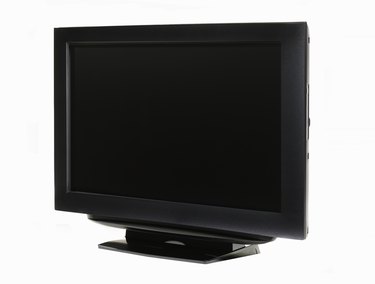
Avoid putting your LCD, or liquid crystal display, TV where it will be hit by beams of direct sunlight or using your LCD TV outdoors. LCD TVs must be protected from strong direct sunlight. The heat from the sun can physically damage LCD screens. Ultraviolet rays in direct sunlight can also cause the chemicals in the LCD to deteriorate, shortening the life of your screen.
LCDs
Video of the Day
LCDs use special materials that change their forms at a molecular level when an electrical current is applied to them. An LCD TV screen or monitor has a front panel made up of thousands of tiny dots of liquid crystal. The whole screen is backlit by a fluorescent panel. In a color screen, each pixel is made up of three liquid crystal dots, with each dot fronted by a color filter: one red, one blue and one green filter for each pixel. The liquid crystal dots can be made transparent or opaque depending on which colors are needed to make the specific color of a pixel.
Video of the Day
Heat Damage
Direct sunlight falling onto an LCD screen can cause it to become very hot. Just as an LCD TV could be damaged if you installed it near a radiator or another strong heat source, direct sunlight can also affect your TV. The screen's plastic enclosure can be deformed by heat. The liquid crystal in the LCD screen can break down, meaning the display won't work. Other components in the LCD screen can malfunction as they aren't designed to tolerate high heat.
Ultraviolet Light
Sunlight contains strong UV rays -- the same rays that cause sunburn. These UV rays can damage the long chain organic molecules that make up liquid crystals, causing the chains of molecules to break down. The tiny dots making up the screen no longer respond to the electric current by becoming completely transparent or completely opaque, meaning that light will pass through when it should not and light that should be allowed to pass will not. The damage is cumulative; over time, an LCD TV exposed to strong UV rays will lose definition, contrast and brightness.
UV Protection
Ordinary window glass cuts out many frequencies of UV light from the sun's rays, reducing UV exposure for items indoors. LCD TVs are designed to withstand normal exposure to sunlight, but if the screen is left in bright sunlight from an open window or door for prolonged periods, its performance may be affected even if it doesn't become hot.
Positioning Your Screen
Install your LCD TV in a position where direct sunlight won't strike it continually. Avoid locations such as in front of windows or glass doors. As well as sunlight, keep your TV away from radiators, heaters or open fires. Apart from the possible damage to your TV, strong sunlight reflecting off the screen can obscure the picture, making it harder to see the picture properly.